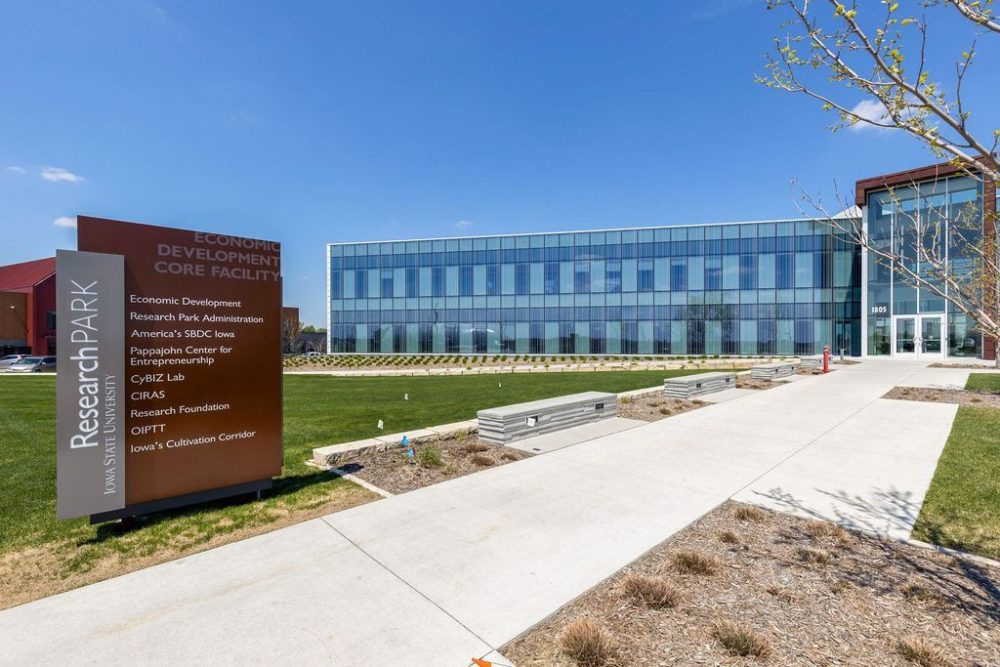Editor’s note: This sponsored post has been published in partnership with America’s Cultivation Corridor.
For generations, agricultural innovation has been driven by the need for farmers to increase productivity to feed their families, communities, and the world. Today’s farmers and agricultural innovators are in the midst of a critical shift to meet the world’s growing demand for food, fuel, and fiber, while producing higher quality, more nutritious foods in ways that are more sustainable and efficient than ever before.
Companies and researchers at the Iowa State University (ISU) Research Park in Ames, Iowa, are leading the way to ensure agriculture is part of the solution to global challenges. In the heart of the US’s grain production and the center of one of the nation’s largest livestock-producing states, the Research Park provides innovators with access to world-class research and facilities – all within minutes of the farmers that will put their technologies to work.
“As today’s farmers and livestock producers move toward more sustainable production, the cutting-edge resources available at Iowa State and the ISU Research Park are more vital than ever,” said Billi Hunt, executive director of America’s Cultivation Corridor. “The organizations are engaging with companies to help deliver the innovative technologies that will be necessary in coming decades.”
More than 100 companies are located in the ISU Research Park located just south of the university’s main campus. These range from 33,000 square feet Technology Innovation Center that John Deere opened in 2019, to research and development facilities for leading companies like Kent Corporation, Sukup Manufacturing Co, Boehringer Ingelheim, Merck, Vermeer Corporation, and Zoetis, to office and lab spaces for new startups in every phase of development.
Booming businesses
Several of the fastest-growing startups focused on both innovation and sustainability have locations at the ISU Research Park.
Pivot Bio opened its Customer Success Center in March 2019 and is now expanding into new space at the Research Park. The Customer Success Center houses the company’s customer service team and provides world-class facilities for sales training, customer interactions, a hub for Central Iowa employees, and more. Just 75 steps away from a field test plot, it provides the best of both worlds for the growing startup.
“As we looked at possible locations for a Midwest-based center, the ISU Research Park provided the best combination – a location in in the Iowa corridor alongside leading ag companies, proximity to one of the best ag research universities and students, and close to many of our customers,” said Mark Reisinger, vice president – commercial operations for Pivot Bio.
The startup is focused on developing a microbial product that can replace synthetic nitrogen fertilizer. Its second-generation product – Pivot Bio PROVEN 40 – enables corn growers to replace up to 40 pounds per acre of synthetic nitrogen with nitrogen that is produced by the plant itself. In 2021, Pivot Bio tripled its sales and replaced synthetic nitrogen on more than 1 million acres of US farmland. Over the next decade, the company’s technology is forecast to help prevent about $200 billion of environmental damage by replacing synthetic nitrogen and avoiding its adverse effects.
Dryland Genetics, a seed company using proprietary breeding approaches to quickly develop new varieties of proso millet, was founded by faculty members of Iowa State University and the University of Nebraska and is headquartered at ISU Research Park.
Proso millet is a water-use-efficient grain grown in the high plains from Texas to Canada, with approximately a half-million acres under production in Colorado, Nebraska, and South Dakota. Dryland Genetics’ varieties are showing yield increases of 10% to 40% over multiple years in both company trials and in farmers’ fields. Farmers can plant and harvest proso millet using the same equipment they use for wheat. Because proso millet is typically grown in rotation with wheat, this lowers barriers to expanding the acreage of this water-sipping grain.
The company recently announced it raised $3.8 million in venture financing as part of a round led by Next Level Ventures, of Des Moines, and Stine Seed Farm, of Adel, with additional investment coming from its existing investors.
Big benefits regardless of size
The Park’s proximity to dozens of industry leaders and forward-thinking startups provides opportunities for collaboration and information sharing.
“Companies of all sizes are finding the Research Park the best place for them to develop, test, and bring to market new ideas,” said Rick Sanders, president and director of ISU Research Park. “The talent pipeline, access to research infrastructure and specialized equipment, and ability to connect with other agricultural and bioscience leaders is second to none.”
Summit Carbon Solutions, created by Summit Agricultural Group earlier this year, is working to lower the carbon footprint of biorefineries and other carbon dioxide emission sources throughout the Midwest by developing the world’s largest carbon capture and storage project.
Expected to be operational in 2024, the Summit Carbon Solutions project will be able to capture and permanently store more than 12 million tons of carbon dioxide annually, the equivalent of taking 2.6 million cars off the road per year, or the same amount of carbon stored by 14.7 million acres of forest. Summit Carbon Solutions will construct an underground pipeline system across five states, including North Dakota, Nebraska, Iowa, Minnesota, and South Dakota, and more than 30 ethanol plants for long-term underground sequestration.
In addition to access to researchers and Iowa State resources such as the BioCentury Research Farm, the ISU Research Park also houses a wealth of resources for entrepreneurs, including ISU Pappajohn Center for Entrepreneurship, ISU Startup Factory, America’s Small Business Development Center – Iowa, and the Ag Startup Engine.





